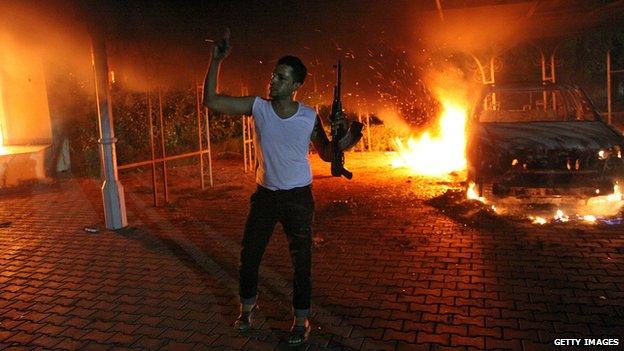Profile: Libya's Ansar al-Sharia
- Published

Mohammad al-Zahawi, head of Ansar al-Sharia
Libya's Ansar al-Sharia has come under the spotlight in recent weeks following the launch of attacks against the group in Benghazi. Retired General Khalifa Haftar, the self-declared leader of the Libyan National Army, announced the launch of Operation al-Karamah (Dignity) in May 2014 with the aim of cleansing Libya of "terrorism and extremism".
Ansar al-Sharia's leader, Mohammad al-Zahawi, 46, has urged Libyans not to be taken in by Gen Haftar's operation. The statement came only days after a series of deadly attacks and confrontations with pro-Haftar forces.
In the same statement, Mr al-Zahawi said that the group opposes the interim government and democracy in the country, vowed to fight back and warned the US not to intervene, reminding it "of its despicable defeats in Iraq, Afghanistan and Somalia, and that it will see worse from Libya than what it has seen [so far]".
The group

Ansar al-Sharia wants Islamic law across Libya but is based in Benghazi
Ansar al-Sharia is an Islamist militia calling for the implementation of strict Sharia law across Libya. The group, whose name means "Partisans of Islamic law" in Arabic, emerged following the February 2011 anti-Gaddafi uprising.
It is made up of former rebels from several militias based in eastern Libya, notably the Abu Obayda bin al-Jarah Brigade, the Malik Brigade and the 17 February Brigade.
The group was officially formed in June 2012 when it issued the "Ansar al-Sharia First Meeting", a communique announcing its inauguration. The number of rebels that fight for the group remains unknown.
The group operates mainly in Benghazi and denies having any presence elsewhere in Libya.
The group's base in Benghazi's Quwarshah district was reportedly bombarded with surface-to-surface missiles by Gen Haftar's forces.
Opposition to Gaddafi's rule was especially strong in eastern Libya as many people there accused him of centralizing power in Tripoli and neglecting the east economically and socially.
Little is known about Mr al-Zawahi. He is from eastern Libya and was jailed in Tripoli's Abu Salim prison for standing up to Gaddafi.
Benghazi attacks
The group gained prominence in September 2012 for its alleged role in the Benghazi attacks that led to the burning of the US consulate and the killing of the US ambassador to Libya, Christopher Stevens. The group denies any involvement.
"They were not known [in] Libya before the revolution. We had the Libyan Islamic Fighting Group, we had the Muslim Brotherhood, we had Salafis but this group, we did not hear about until recently, until after the revolution started," Libyan diplomat Ahmad Jibril has told the BBC.

The September 2012 attack on the US consulate in Benghazi was blamed on Ansar al-Sharia
In October 2012, the group became known as Ansar al-Sharia in Libya (ASL), most likely to differentiate itself from Tunisia's Ansar al-Sharia group.
From October 2012 onwards, Ansar al-Sharia had confrontations with a number of Libyan groups, many of which joined the Libyan army in Benghazi. Following these confrontations, the group reduced its military presence in the city but kept close links to the prominent Islamist 17 February Brigade group.
Charity work, Da'wah
Ansar al-Sharia subsequently started focusing on charity and da'wah - or Islamic call - work, distancing itself from militancy until the recent clashes with Gen Haftar's forces. Along with its advocacy work, which shows the group's organizational strength, Ansar al-Sharia operates social and education programmes to gain local support.
The group provides social services, ranging from cleaning the streets and regulating traffic, to helping the needy and establishing cultural centres across Benghazi. This has helped Ansar al-Sharia raise funds in the form of donations from Libyan expatriates.
Links to other groups?
This form of charitable work is not unique to Ansar al-Sharia in Libya. Indeed, the original purpose behind the creation of the Ansar al-Sharia brand, thought to be a front for al-Qaeda and which today exists in several Muslim countries, was to avoid the negative attention associated with the al-Qaeda name, with the group operating at the grass-root levels to build a public support base.
However, Ansar al-Sharia has resorted to violence when threatened and has launched attacks against other Libyan groups on several occasions.
The group denies any links to al-Qaeda or other militant groups outside Libya, although the Tunisian security officials pointed to operational, financial and logistical links between Ansar al-Sharia in Libya and Ansar al-Sharia in Tunisia (AST), with the latter receiving weapons from its Libyan counterpart.
Ansar al-Sharia's commitment to launch attacks suggests that the conflict in Libya will still get bloodier.
Africa's militant Islamist groups
Jihadist groups around the world
BBC Monitoring, external reports and analyses news from TV, radio, web and print media around the world. For more reports from BBC Monitoring, click here. You can follow BBC Monitoring on Twitter , externaland Facebook, external.